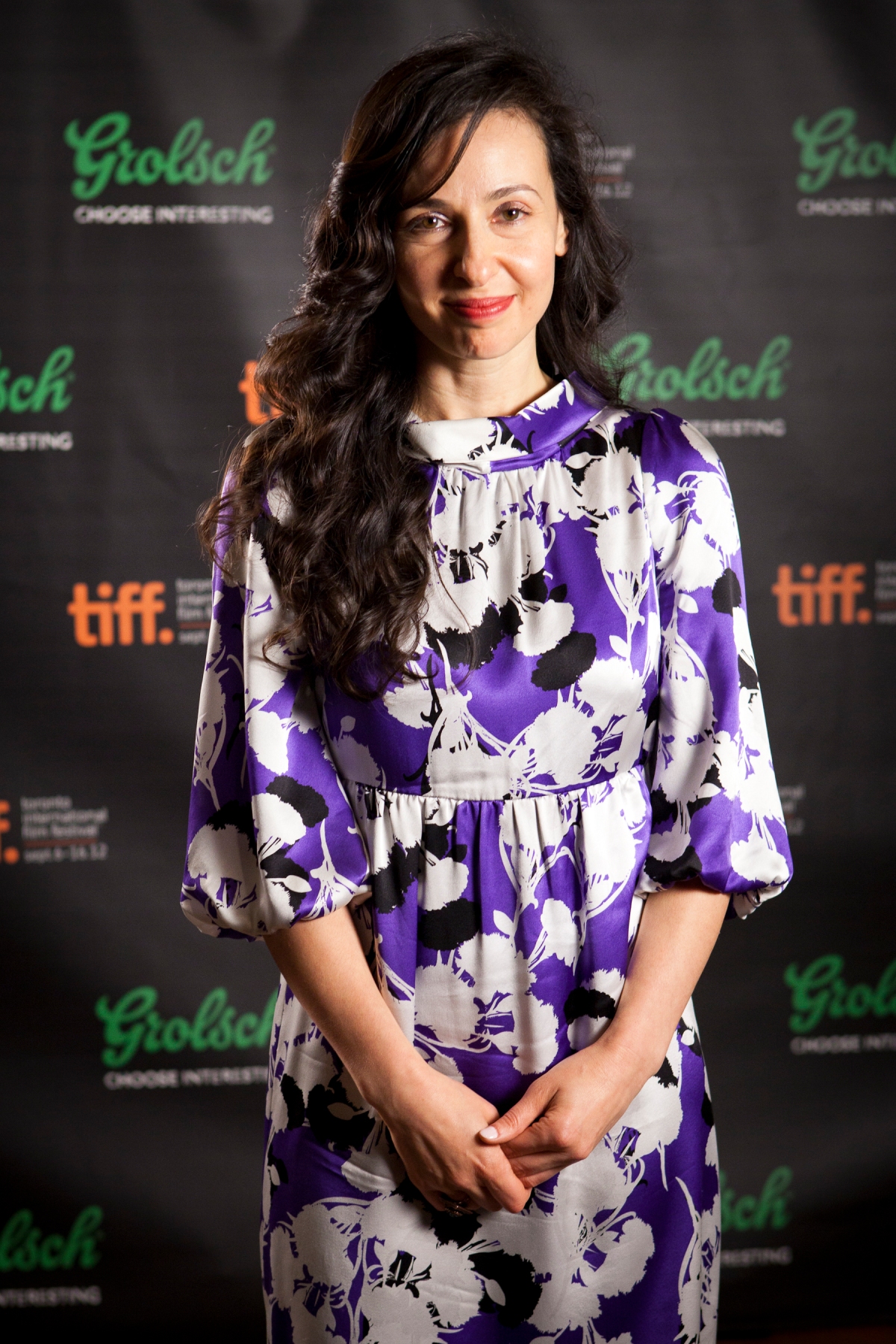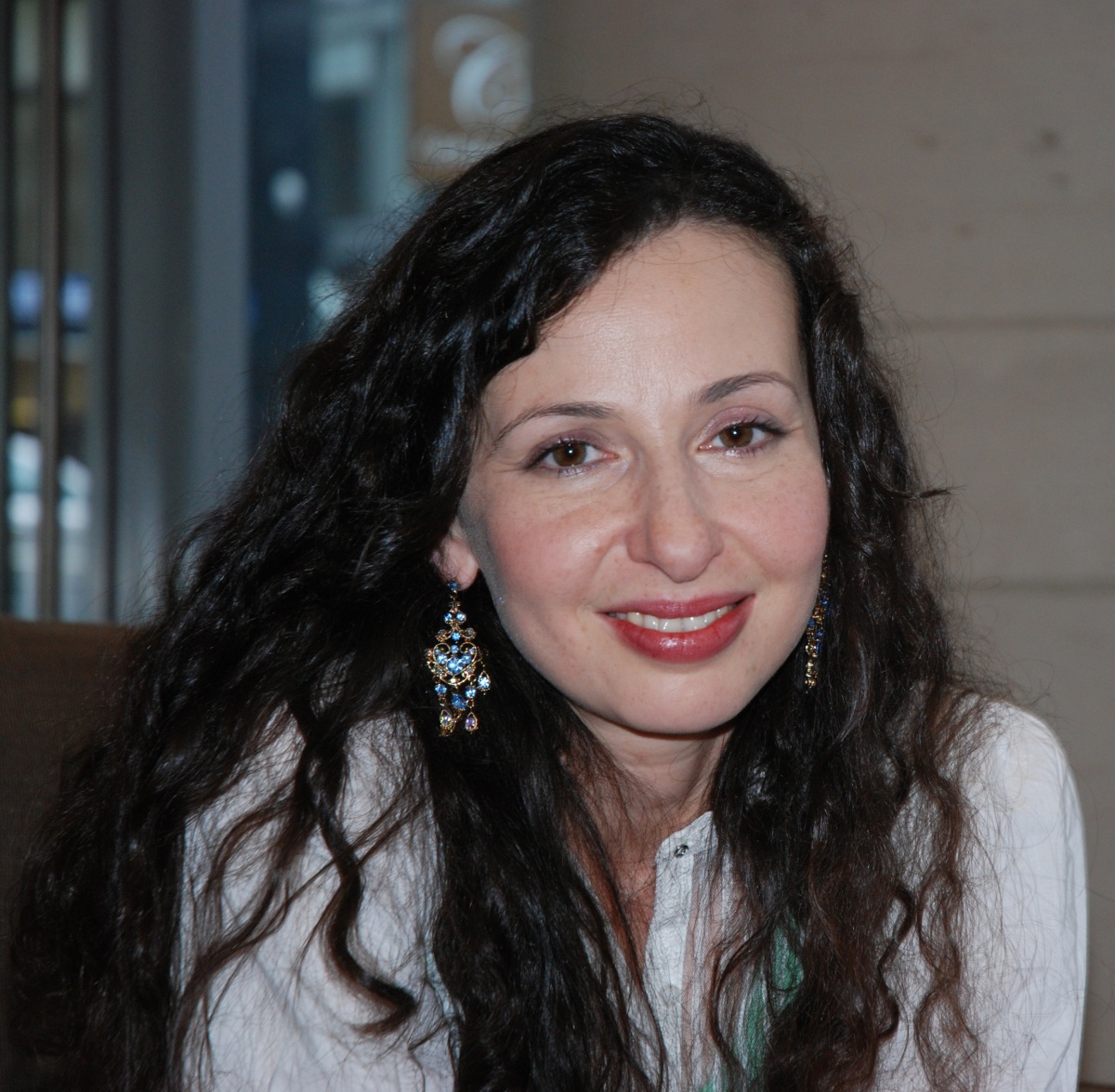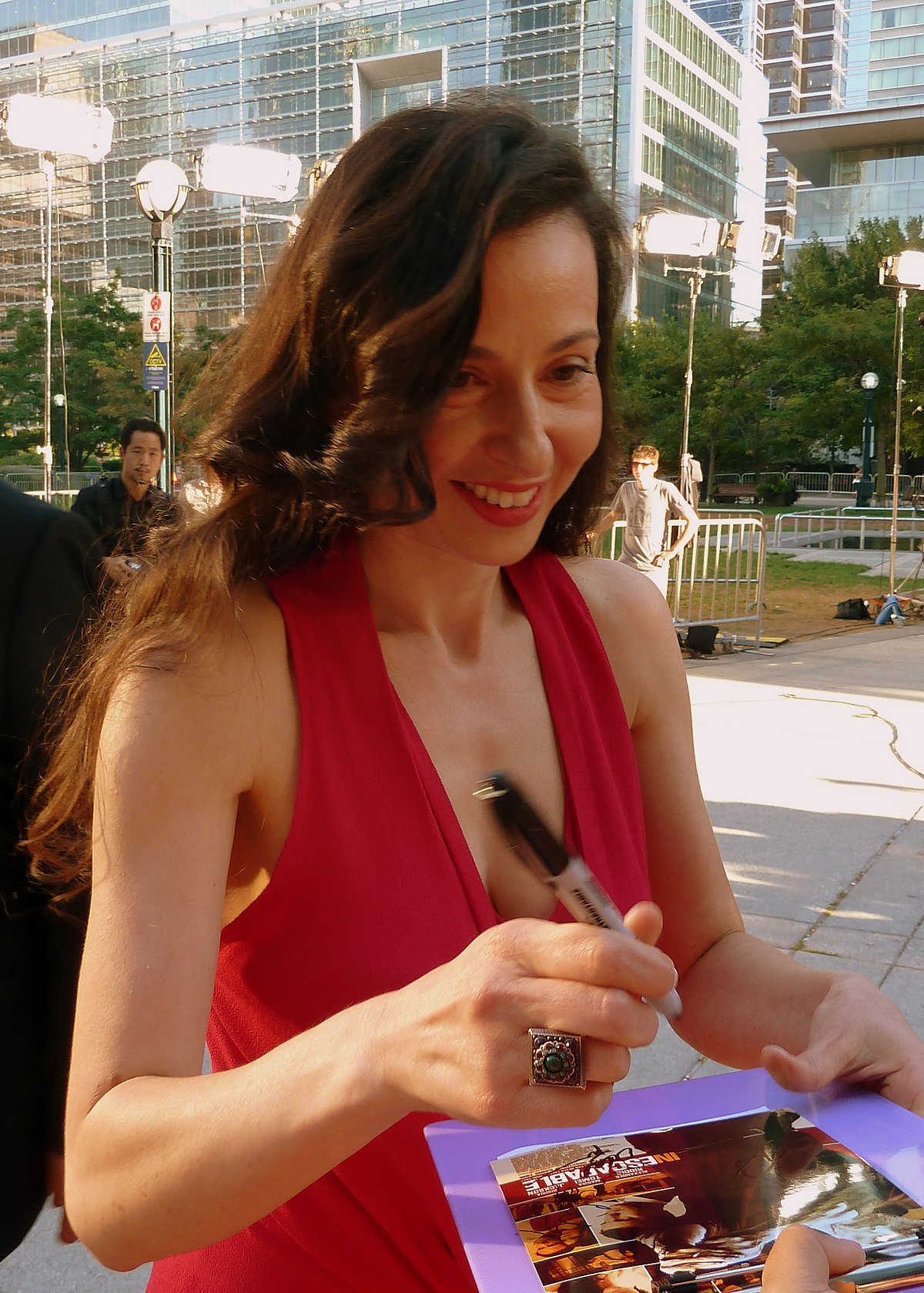With combative ex-flame Fatima (Marisa Tomei) in tow, Adib receives a visa through bribery and begins a desperate search for his daughter that involves the mostly unhelpful assistance of a Canadian diplomat (Joshua Jackson) and a former colleague in the Syrian military intelligence service (Oded Fehr), as well as a few bullets whizzing past his head. As the red herrings mount, including Israeli espionage and an oddball pedophile ring, Adib finds it increasingly impossible to keep the past from rearing its ugly head.
Born to a Syrian mother and Palestinian father, the 40-year-old Nadda was an extremely prolific short filmmaker in the late 90′s after graduating from NYU, directing nearly a dozen shorts in half as many years. She has directed five features, perhaps most prominently 2009′s Cairo Time, with Siddig and Patricia Clarkson.



Ruba Nadda, whose Cairo Time captured Best Canadian Feature in 2009, returns to TIFF with Inescapable. Both star leading man Alexander Siddig and are set in the Middle East. However, Inescapable is anything but a charming romance, but rather a fast-paced political thriller set in the most dangerous country in the world, Syria.
When he learns that his daughter has gone missing in Syria, Adib (Siddig) leaves his comfy business in Toronto to track her down in Syria. Turns out that the Syrian government has abducted Adib’s journalist daughter and that a shady Canadian diplomat (Joshua Jackson) knows more about it than he lets on. Adib gets help from old flame (Marisa Tomei) who’s chagrined to help find the daughter of the man she almost married 20 years ago.
Credit Nadda for making a thriller. Though it sounds mad to Americans, the Canadian film system frowns on genre pictures and encourages filmmakers to produce arthouse fare or low-budget drama. Not only that, but Nadda is also stepping away from the romantic films she’s known for. As her first thriller, Inescapable is not bad. The film’s strongest suit is Siddig, who carries the picture. He’s completely absorbing as a distraught father on a mission and as a political rogue to the Syrian government. He and Marisa Tomei are believable as old flames, though their relationship is a little undersketched.
Whereas Cairo Time was dreamy, Inescapable is all action, fast and furious, though the music is heavy-handed at times and the pacing suffers some awkward jolts. In particular, the ending fails to reach an explosive climax, only partially so in an action sequence. Despite its flaws, Inescapable launches the viewer on a gripping ride through the darkest part of town — in this case, Damascus.
Ironically, the seeds of Inescapable were planted long before the Syrian uprising. “Back in 2005 when I was travelling with Sabah,” her first feature, explains Nadda, “I was in the Middle East and my dad was not happy about me being there by myself. I called home to let him know I was fine and okay. He said, ‘Don’t go missing. Don’t make me come after you.’ And I thought, ‘What a great idea!’ ”
Nadda wrote Inescapable at the same time as Cairo Time, to keep her creative juices flowing. The thriller aspect evolved organically, but Nadda feels that “this is a personal story about a man on a desperate search to find his daughter. Because I’m Syrian, I always wanted to set a story in my old home.” Nadda lived there till she was 12 and feels that her film is a vindication. “I feel justified, because for years when I was trying to finance this movie, people were asking, ‘Why are you setting this movie in Syria? Audiences don’t care. They can’t find Damascus on a map. This is crazy of you.”




Obviously, Nadda couldn’t film in the Middle East because of the Arab Spring, and settled for Johannesburg, South Africa, where she shot six-and-a-half day weeks, totalling 26 brutal days. Nadda couldn’t compete with the rapidly changing events in Syria and so did not try to depict the war, which began as a public protest and has descended into bloody anarchy. “I knew as a Syrian that the President wasn’t going to fall as easily as [Egypt's] Mubarak,” she says. In Inescapable, Syrian President Bashar al-Assad’s poster hangs on every street corner like Big Brother, which Nadda insists is not a deliberate decision, but an accurate depiction of the capital. “It’s eerie. He’s always watching you.”
Siddig raises a wider point: “To date, 25,000 people have died. Sooner or later someone in Syria–who’s lost someone like a brother or sister–is going to see this film and they mustn’t feel that we have come in and made a film on the back of their misery.”

Filmmaker: Your new movie has the mechanics of the thriller, but it seems more interested in the difficulties of leaving a repressive culture behind. How did that come about, that desire to make a genre film set amongst these concerns?
Nadda: Thank you. This kind of came about very unexpectedly. Initially I’d written a script that was a very simple genre, about a man, and I started writing it about seven years ago. It was about a man doing business in Syria, and I understood what that country was about, and I’ve lived in Damascus and that regime scares the living daylights out of me. And so I understood the paranoia, the constant feeling that you’re being watched. The way I write, I get a feel for a character and I follow them through ups and downs of the story. A couple of years ago, a lot of people were like, “What if we changed it from Syria…?” They didn’t understand what that country was like with specifically how the regime was, and then after the Arab Spring hit, people were a lot more understanding of it.
But what happened was that was a big problem for me because I was never going to be able to shoot in Syria, I was going to have to try and shoot in Jordan. And so once Arab Spring hit, we realized we just could not go to the country, we could not get insurance. Because I was going to have to shoot in another country, it turned to more of a drama than I anticipated because it was sort of like,”This is the budget that we have,” and it became a little more heightened. But in the beginning I wasn’t really trying to make a spy movie. I think once we shot the movie and realized I was falling into all these tropes — I really wasn’t trying to I swear — it just turned into that when I shot the movie.
Filmmaker: Looking back on the project now, has your perspective on what you did as a filmmaker changed given the extraordinary amount of violence that’s been taking place in Syria? Has it reshaped how you view this film?
Nadda: Yeah. It’s very difficult, you know. Because I spent about four years of my childhood there, from the ages of twelve to seventeen, and I saw people going missing all the time. It’s kind of ingrained in me. I know that you can’t say something out loud without fear of serious repercussions not just to the individual but to the entire family because they have ways of not just wiping you off the entire face of the planet but wiping your whole family off the entire face of the planet. So there’s a lot of anger I think towards the country, because I’m furious. But at the same time, when I shot my last movie, we could feel that the citizens were fed up of the corruption there. And so there’s a part of me that is… the people have had it, and they’re trying to revolt, but there’s a part of me that’s very very careful because what a revolt looks like there is very different than what it looks like in North America. Here we have rights, we have laws, we have protections. There it’s very dangerous. And so my heart really goes out to the people there. My sisters are in Canada, but my entire family is still in Syria.
Filmmaker: Was it difficult to finance this movie? Even with Marisa Tomei and some conventions of a commercially popular genre, it’s clearly not an action film in the strictest sense. Were there concessions you had to make in terms of how you made the film, or were you able to make the film you wanted to, more or less? Would it be less or more difficult to finance this movie now, given that Syria’s in the news?
Nadda: Yeah, thank you for those questions. It was brutal, financing this movie. I don’t know if I’d do it again. Alexander Siddig, he’s a beautiful actor, he’s ridiculously talented, but he’s not a star. In independent films, you need names; they get you the money. So I don’t know if I would do it again, it was heartbreaking. Two times the movie fell apart when I was in the middle of pre-production; the financing fell apart and we had to take a year and regroup. So I had two concessions that I would not do again, and one of the concessions was they told me I had to cast a name for Fatima. And the other was that I had to beef up that thriller element; I had to give it something, it couldn’t just be a character drama. I lucked out with the movie, it’s gone practically all around the world, and for a female director that’s important enough, that’s how I get to make my next movie. Making this movie got brutal. I did it, but my next one is going to be a little different.
Filmmaker: Was it difficult given the fact that one of your two leads was playing an ethnicity she may or may not have been previously familiar with?
Nadda: It’s difficult. I am being very truthful, there were a lot of things that we had to cut because they didn’t feel right. Marisa was ridiculously hard-working. One of the things that we did was we sent her for three weeks to Beirut, where she could think like an Arab woman. And I recorded my mother speaking in English and Arabic, and so her transformation from her acting coach and all this stuff from Syria was massive, but I had to be really protective of Marisa. And I think she pulled it off, I think she’s… I mean, she’s Italian so there’s a lot of cultural similarities because they’re Mediterranean. But at the same time there are a lot of scenes where it was tough. It was tough to go through. But I had to make a movie.
Filmmaker: What were some of the most difficult aspects of making the film itself? Obviously the genre stuff and some of the violence at the end is sort of a departure from some of the stuff you’re known for…
Nadda: Definitely. I think one of the major things for me being honest with you was not shooting on location. South Africa was great, we shot in Johannesburg and we were really aggressive about making sure it looked like Syria, because I bought a lot of stuff out of Syria and shipping it to Johannesburg. But I think one of the biggest problems I faced as a director was the movie is set in Damascus, and so I think I had to shoot somewhere in the Middle East because I could fake the look but I needed the cast, I needed actors. There are all these scenes in this movie I had written about this man who goes into his past and one of the angles on that was, he sees his sister, he sees his brother-in-law, and realizes the weight of what it means to be an immigrant and leave your country and not come back in 30 years. But those scenes, these emotional scenes of this character had to be cut because I couldn’t find actors to pull this off. When we were in the Middle East it was like I was a kid in a candy store, just point the camera and shoot, it was not a problem. And so I think that was one of the biggest challenges for me was not being able to shoot in the Middle East. It really tied my hands.
Filmmaker: And how do you solve that? Is there any model for the kinds of movies that you want to make, to be able to make them effectively? It seems like such a burden for independent filmmakers nowadays.
Nadda: I don’t know. The way the economy is going, people want your films to be successful. And I don’t know why it’s different for a female director, I don’t really agree, but the film has to be successful or forget it, you’re done. And so I think with this movie it was brutal. And I think that’s why what the script was and what I ended up with a movie are two very different things. And the script that I had I couldn’t shoot, I couldn’t shoot in the Middle East. So I had to ramp up the other parts of the script. And I tried to pull it off, I think I pulled it off. But for my next movie, I’m gearing up for it, and it’s an independent film and it’s going to star Patricia Clarkson again, but it’s going to be in Canada. And it’s a thriller, but I got enough of shooting outside of North America. It’s just too much. I’ve been rolling the dice too much.
Filmmaker: Once you’d gotten to the editing room with Inescapable, given that you were consciously trying to make the thriller elements a little bit more potent, was it a challenge to not make Taken? Did it still have this emotional sophistication that you imagined initially that was maybe difficult to pull off given the circumstances?
Nadda: Everybody around you is pressuring you to make Taken, and I like Taken, but my movie is not Taken. And so everybody around you is really pressuring you to do that movie. [There was a] lot of pressure. And I only had 25 days to shoot this movie. It was 25 days, it was a budget, there’s the car sequence at the end that you see, that was shot in one afternoon. A lot of action sequences that you saw were one take. I didn’t have a choice! I’m happy that it was so brutal because I feel like I learned a lot, and so [for] my next movie I know now what to do, what pitfalls to avoid. And I think I’m going to get better, definitely I’m going to get better. Because I think sometimes you need to get through these horrifying experiences and if you can come out of them, more power to you. But I don’t like it. To answer your question is with these independent-type movies, your heroes, the protagonist, has to be a main actor. That’s the way you pull it off. And if it’s not, you’re kind of in trouble, I think.


Filmography
- 1997: Wet Heat Drifts Through the Afternoon
- 1997: Interstate Love Story
- 1997: Do Nothing
- 1998: The Wind Blows Towards Me Particularly
- 1998: So Far Gone
- 1998: Damascus Nights
- 1999: Slut
- 1999: Laila
- 2000: I Always Come to You
- 2000: Blue Turning Grey Over You
- 2000: Black September
- 2000: I Would Suffer Cold Hands for You
- 2001: Unsettled
- 2004: Aadan
- 2005: Sabah
- 2009: Cairo Time
- 2012: Inescapable
Árabes de Canadá
Sabah, de Ruba Nadda (Canadá, 2005, 86 min.).
Sabah, que está a punto de cumplir cuarenta años, lleva una vida tranquila en Toronto. Es una mujer musulmana inteligente y atractiva, cuya pasión e independencia se han visto mermadas por veinte años atendiendo a su familia. De pronto, se enamora de Stephen, lo que hace que comience a vivir una doble vida.
Incendios, de Denis Villeneuve (Canadá, 2010, 113 min.).
Jeanne y Simon se quedan perplejos cuando, durante la lectura del testamento de Nawal, su madre, en Montreal, el notario les entrega dos sobres, uno destinado a un padre que ellos creían muerto y el otro a un hermano cuya existencia ignoraban. Juntos viajan a Oriente Medio y reconstruyen la historia de Nawal, una mujer muy especial cuyo destino trágico estuvo marcado por la guerra y el odio.
Cairo Time, de Ruba Nadda (Canadá, 2009, 90 min.).
Juliette, editora de una revista, viaja a El Cairo para reunirse durante las vacaciones con su marido, Mark, quien trabaja en la franja de Gaza para la ONU. Mark, que no puede llegar en la fecha prevista, envía a su amigo Tareq para que acompañe a su mujer en sus paseos por la capital egipcia. Lo último que se espera es que ambos se enamoren.
¿Hotel Canadá?, de Aliaa Khachouk (Canadá, 2011, 30 min.).
A través de dos mujeres, de origenes sirio y libanés, y de un sudanés que viven en Montreal, esta película explora el sentido de pertenencia e identidad del inmigrante árabe en Norteamérica. El documental destaca la mejoría económica y a nivel humano y, aunque se evoca con nostalgia el país de origen, el sacrificio se ve compensado.
Bajo el mismo cielo, mujeres árabes en Norteamérica hablan sobre el hiyab, de Jennifer Kawaja (Canadá, 1999, 43 min.).
Este documental presenta los puntos de vista de mujeres que portan el hiyab y de las que deciden no hacerlo. Mientras que cada una tiene sus razones para vestirse de una u otra manera, la mayoría considera que el hiyab es una expresión de fidelidad a la cultura árabe, al islam pero, sobre todo, rehúsan ser catalogadas por su apariencia.
ENLACES/FUENTES:
http://collectivefriction.com/2012/09/10/tiff-interview-with-ruba-nadda-september-9th-2012/
http://dialogoscinefilos.blogspot.com.ar/2010/10/cairo-time.html
http://en.wikipedia.org/wiki/Ruba_Nadda
http://filmmakermagazine.com/52010-ruba-nadda-and-alexander-siddig-return-to-tiff-with-inescapable/
http://filmmakermagazine.com/65436-ruba-nadda-on-inescapable/
http://serbagunamarine.com/ruba-nadda.html
http://thebourne-legacy.blogspot.com.ar/2010/08/clarkson-siddig-and-egypt-share-screen.html
http://trustmovies.blogspot.com.ar/2010/08/clarkson-siddig-and-egypt-share-screen.html
http://www.casaarabe.es/noticias-arabes/show/arabes-de-canada
http://www.casaarabe.es/noticias-arabes/show/arabes-de-canada-arte-en-movimiento
http://www.mattriviera.net/2010/07/life-in-100-films-sabah.html




No hay comentarios.:
Publicar un comentario